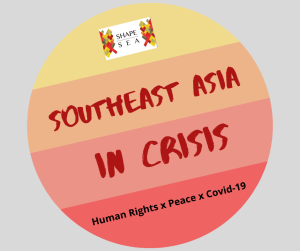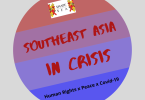Sam CartmellMinority Rights Group International’s Southeast Asia Programme Coordinator for the “Enhancing Quality and Universal access to Indigenous People’s reproductive healthcare†(EQUIP) programme. MRGI is documenting challenges minorities and indigenous peoples face in relation to the current COVID-19 health crisis; please visit https://minorityrights.org/coronavirus/report-discrimination/ to learn more or to report your experience.
 Months into this pandemic it is still surprisingly common to hear the sentiment ‘this virus does not discriminate, we are all equally at risk.’ That is not true. There are examples from around the world showing that certain segments of society disproportionately suffer from the SARS-CoV-2 virus and its wider socio-economic impacts.In early April shocking statistics revealed that African Americans in many US cities were becoming infected with the virus and dying from COVID-19 at many times their representation in the population. Similar statistics are seen in Norway and the UK. Globally, there are growing demands by doctors and community representatives for all governments and healthcare providers to disaggregate COVID-19 data by race and ethnicity. In addition to racial and ethnic minorities, other marginalized groups are disproportionately vulnerable during this pandemic; factors include employment status, income-level, political exclusion, access to healthcare, co-morbidities, disability, religious affiliation, sexual orientation, housing status, and immigration status.In Southeast Asia, the extent to which COVID-19 related health outcomes and socio-economic impacts differ for minorities remains unknown. One reason being that there is no data. A review of the official COVID-19 data reporting platforms for Cambodia, Malaysia, Myanmar, Philippines and Singapore indicates that governments in the region are not collecting and publishing data disaggregated by ethnicity or characteristics relevant to marginalized groups. The lack of disaggregated data is a glaring gap in the region’s COVID-19 response.All ASEAN countries have agreed to the 2030 Agenda for Sustainable Development, and as such have already made a commitment to meeting the goals and targets “for all nations and peoples and for all segments of society†and to collecting “timely and reliable data disaggregated by income, gender, age, race, ethnicity, migratory status, disability, geographic location and other characteristics relevant in national contexts.†Disaggregated data is key to achieving the Sustainable Development Goals (SDGs).The Permanent Forum on Indigenous Issues has recommended “the disaggregation of data on the basis of indigenous identifiers/ethnicity and the full and effective participation of indigenous peoples†in achieving the SDGs. In response to the current pandemic, the Forum has noted that “data on the rate of infection in Indigenous  peoples are either not yet available (even where reporting and testing are available), or not recorded by ethnicity.â€The United Nations Population Fund has identified indigenous women as being particularly vulnerable to health related discrimination; resulting in worse access and poorer health outcomes than majority populations. Due to a general lack of disaggregated data these negative impacts are often ‘invisible’ and harder for governments and other stakeholders to ameliorate.Without the collection of disaggregated data in Southeast Asia, we don’t know whether the impacts of the pandemic are significantly different for minorities and marginalized groups than for majority populations. In the context of a virus outbreak, this blind spot poses a serious public health risk as it may allow pockets of infection go unnoticed and spread more widely. In addition to the social good of providing appropriate healthcare and justice for minorities, it is in the self-interest of majority populations to address the health needs of minority and marginalized populations.Southeast Asian governments and other stakeholders – such as civil society and community-based organizations, international humanitarian and non-governmental organizations, faith-based groups, private sector, and ethnic armed organisations – should immediately bring a minority-sensitive approach to their COVID-19 response efforts, including:
Months into this pandemic it is still surprisingly common to hear the sentiment ‘this virus does not discriminate, we are all equally at risk.’ That is not true. There are examples from around the world showing that certain segments of society disproportionately suffer from the SARS-CoV-2 virus and its wider socio-economic impacts.In early April shocking statistics revealed that African Americans in many US cities were becoming infected with the virus and dying from COVID-19 at many times their representation in the population. Similar statistics are seen in Norway and the UK. Globally, there are growing demands by doctors and community representatives for all governments and healthcare providers to disaggregate COVID-19 data by race and ethnicity. In addition to racial and ethnic minorities, other marginalized groups are disproportionately vulnerable during this pandemic; factors include employment status, income-level, political exclusion, access to healthcare, co-morbidities, disability, religious affiliation, sexual orientation, housing status, and immigration status.In Southeast Asia, the extent to which COVID-19 related health outcomes and socio-economic impacts differ for minorities remains unknown. One reason being that there is no data. A review of the official COVID-19 data reporting platforms for Cambodia, Malaysia, Myanmar, Philippines and Singapore indicates that governments in the region are not collecting and publishing data disaggregated by ethnicity or characteristics relevant to marginalized groups. The lack of disaggregated data is a glaring gap in the region’s COVID-19 response.All ASEAN countries have agreed to the 2030 Agenda for Sustainable Development, and as such have already made a commitment to meeting the goals and targets “for all nations and peoples and for all segments of society†and to collecting “timely and reliable data disaggregated by income, gender, age, race, ethnicity, migratory status, disability, geographic location and other characteristics relevant in national contexts.†Disaggregated data is key to achieving the Sustainable Development Goals (SDGs).The Permanent Forum on Indigenous Issues has recommended “the disaggregation of data on the basis of indigenous identifiers/ethnicity and the full and effective participation of indigenous peoples†in achieving the SDGs. In response to the current pandemic, the Forum has noted that “data on the rate of infection in Indigenous  peoples are either not yet available (even where reporting and testing are available), or not recorded by ethnicity.â€The United Nations Population Fund has identified indigenous women as being particularly vulnerable to health related discrimination; resulting in worse access and poorer health outcomes than majority populations. Due to a general lack of disaggregated data these negative impacts are often ‘invisible’ and harder for governments and other stakeholders to ameliorate.Without the collection of disaggregated data in Southeast Asia, we don’t know whether the impacts of the pandemic are significantly different for minorities and marginalized groups than for majority populations. In the context of a virus outbreak, this blind spot poses a serious public health risk as it may allow pockets of infection go unnoticed and spread more widely. In addition to the social good of providing appropriate healthcare and justice for minorities, it is in the self-interest of majority populations to address the health needs of minority and marginalized populations.Southeast Asian governments and other stakeholders – such as civil society and community-based organizations, international humanitarian and non-governmental organizations, faith-based groups, private sector, and ethnic armed organisations – should immediately bring a minority-sensitive approach to their COVID-19 response efforts, including:
- Having representatives of ethnic minority and marginalized communities themselves collect and interpret the data.
- Facilitating the participation of indigenous people, ethnic minorities and marginalized groups in developing COVID-19 response plans.
- Analyzing existing health data to identify potential vulnerabilities of minorities and marginalized people, and designing mitigation measures.
- Mainstreaming the collection and publishing of disaggregated data on national COVID-19 reporting platforms.
Undoubtedly there are risks and sensitivities around ethnicity-based data disaggregation – for example in Cambodia – and the approach may need to be different in different countries. Governments should take the lead from ethnic minority and marginalized people. ASEAN may have a role to play by promoting standardized data collection and publication guidelines which minimize the potential use of the data for discrimination or hate speech.The benefits of disaggregated COVID-19 data are numerous: providing a fuller picture of the impact of the virus across the region; identifying emerging pockets of outbreak in minority communities; targeting previously hidden vulnerabilities of minority populations; creating more effective IEC materials tailored to minority communities in their own languages; and enabling governments to fully meet their SDG commitments on health outcomes.————————————– USA. Centers for Disease Control and Prevention. (2020, April 22). COVID-19 in Racial and Ethnic Minority Groups. https://www.cdc.gov/coronavirus/2019-ncov/need-extra-precautions/racial-ethnic-minorities.html Garcia-Navarro, L. (Presenter). (2020, April 12). 7 Out Of 10 Patients Killed By COVID-19 In Louisiana Were African American. Weekend Edition Sunday . Guest speaker Dr. Takeisha Davis. National Public Radio. https://www.npr.org/2020/04/12/832682489/7-out-of-10-patients-killed-by-covid-19-in-louisiana-were-african-american Masri, L. (2020, April 24). COVID-19 takes unequal toll on immigrants in Nordic region. Reuters. https://www.reuters.com/article/us-health-coronavirus-norway-immigrants/covid-19-takes-unequal-toll-on-immigrants-in-nordic-region-idUSKCN2260XW Booth, R. & Barr, C. (2020, May 7). Black people four times more likely to die from Covid-19, ONS finds. The Guardian. https://www.theguardian.com/world/2020/may/07/black-people-four-times-more-likely-to-die-from-covid-19-ons-finds Iqbal, N. (2020, April 18). Failure to record ethnicity of Covid-19 victims a ‘scandal’, says BMA chief. The Guardian. https://www.theguardian.com/world/2020/apr/18/failure-to-record-ethnicity-of-covid-19-victims-a-scandal-says-bma-chief Glover, C. (2020, April 17). Race left out of Canada’s COVID-19 data. The National . Canadian Broadcasting Corporation. https://www.youtube.com/watch?v=beQSp5Zbvpk Davis, M. (2020, March 20). The Coronavirus Crisis Is a Monster Fueled by Capitalism. In These Times. https://inthesetimes.com/article/22394/coronavirus-crisis-capitalism-covid-19-monster-mike-davis Ro, C. (2020, April 21). Coronavirus: Why some racial groups are more vulnerable. BBC Future. https://www.bbc.com/future/article/20200420-coronavirus-why-some-racial-groups-are-more-vulnerable Thomas, C. (2020, March 24). COVID-19 emergency relief must reach everyone, including minorities and indigenous peoples. Thomson Reuters Foundation News. https://news.trust.org/item/20200324141217-not5s/ Nawaz, A. (Presenter). (2020, April 2). COVID-19 may not discriminate based on race — but U.S. health care does. PBS NewsHour . Guest speaker Dr. Uché Blackstock. Public Broadcasting Service. https://www.youtube.com/watch?v=U5QdRwflM9I Devakumar, D., Shannon, G., Bhopal, S., & Abubakar, I. (2020, April 1). Racism and discrimination in COVID-19 responses. The Lancet, 395 (10231), 1194. https://doi.org/10.1016/S0140-6736(20)30792-3 Statement on the Impact of the Global COVID-19 Pandemic on Persons with Disabilities from Minority, Indigenous and other Marginalised Communities. (2020, April 27). https://minorityrights.org/2020/04/27/statement-covid-19-pandemic-on-persons-with-disabilities-from-minority-indigenous-communities/ Meta, K. & Keeton-Olsen, D. (2020, March 21). “Very Lonelyâ€: Cambodian Muslims Face Discrimination as Virus Cases Rise. New Naratif. https://newnaratif.com/journalism/very-lonely-cambodian-muslims-face-discrimination-as-virus-cases-rise/ Office of the High Commissioner for Human Rights. (2020, April 17). COVID-19 and the Human Rights of LGBTI People: What is the Impact of COVID-19 on LGBTI People? https://www.ohchr.org/Documents/Issues/LGBT/LGBTIpeople.pdf Tschirhart, N. (2020, April 27). COVID-19 challenges us to rethink how we protect vulnerable populations. Ottawa Citizen Newspaper. https://ottawacitizen.com/opinion/tschirhart-covid-19-challenges-us-to-rethink-how-we-protect-vulnerable-populations/ Engblom, A., Siripatthanakosol, K., Lephilibert, N., & Baruah, N. (2020, April 17). COVID-19: Impact on migrant workers and country response in Thailand. International Labour Organization Country Office for Thailand, Cambodia and Lao PDR. https://www.ilo.org/wcmsp5/groups/public/—asia/—ro-bangkok/—sro-bangkok/documents/briefingnote/wcms_741920.pdf https://covid19-map.cdcmoh.gov.kh/ https://ukkdosm.github.io/covid-19 https://mohs.gov.mm/Main/content/publication/2019-ncov https://www.doh.gov.ph/covid-19/case-tracker https://www.moh.gov.sg/covid-19 United Nations Division for Sustainable Development Goals. (2020). Transforming Our World: The 2030 Agenda for Sustainable Development. https://sustainabledevelopment.un.org/content/documents/21252030%20Agenda%20for%20Sustainable%20Development%20web.pdf United Nations Economic and Social Council. (2016). Permanent Forum on Indigenous Issues: Report on the fifteenth session (9-20 May 2016). https://www.un.org/en/ga/search/view_doc.asp?symbol=E/2016/43&referer=http://www.un.org/en/documents/index.html&Lang=E United Nations Department of Economic and Social Affairs – Indigenous Peoples. (2020). COVID-19 and Indigenous peoples. https://www.un.org/development/desa/indigenouspeoples/covid-19.html United Nations Population Fund. (2018, March). Indigenous Women’s Maternal Health and Maternal Mortality. https://www.unfpa.org/sites/default/files/resource-pdf/factsheet_digital_Mar27.pdf Hein, A. & Minoletti, P. (2020, April). Coronavirus policy response needs and options for Myanmar. International Growth Centre. https://www.theigc.org/wp-content/uploads/2020/04/Hein-2020-coronavirus-report.pdf Chhengpor, A. & Baliga, A. (2020, March 23). Linked to Viral Outbreak, Cambodian Muslims Facing Backlash. Voice of America Khmer. https://www.voacambodia.com/a/linked-to-viral-outbreak-cambodian-muslims-facing-backlash/5341035.html





